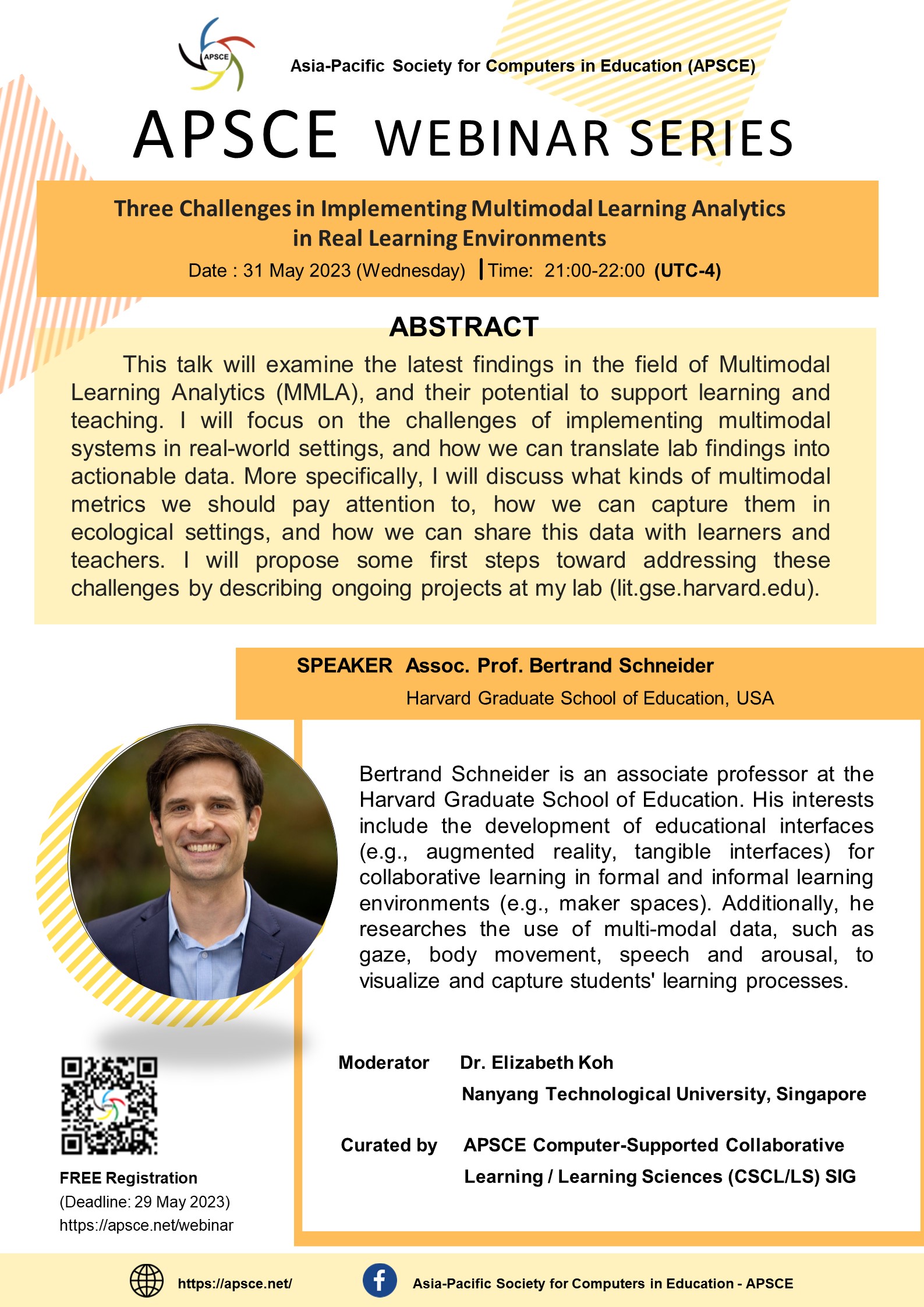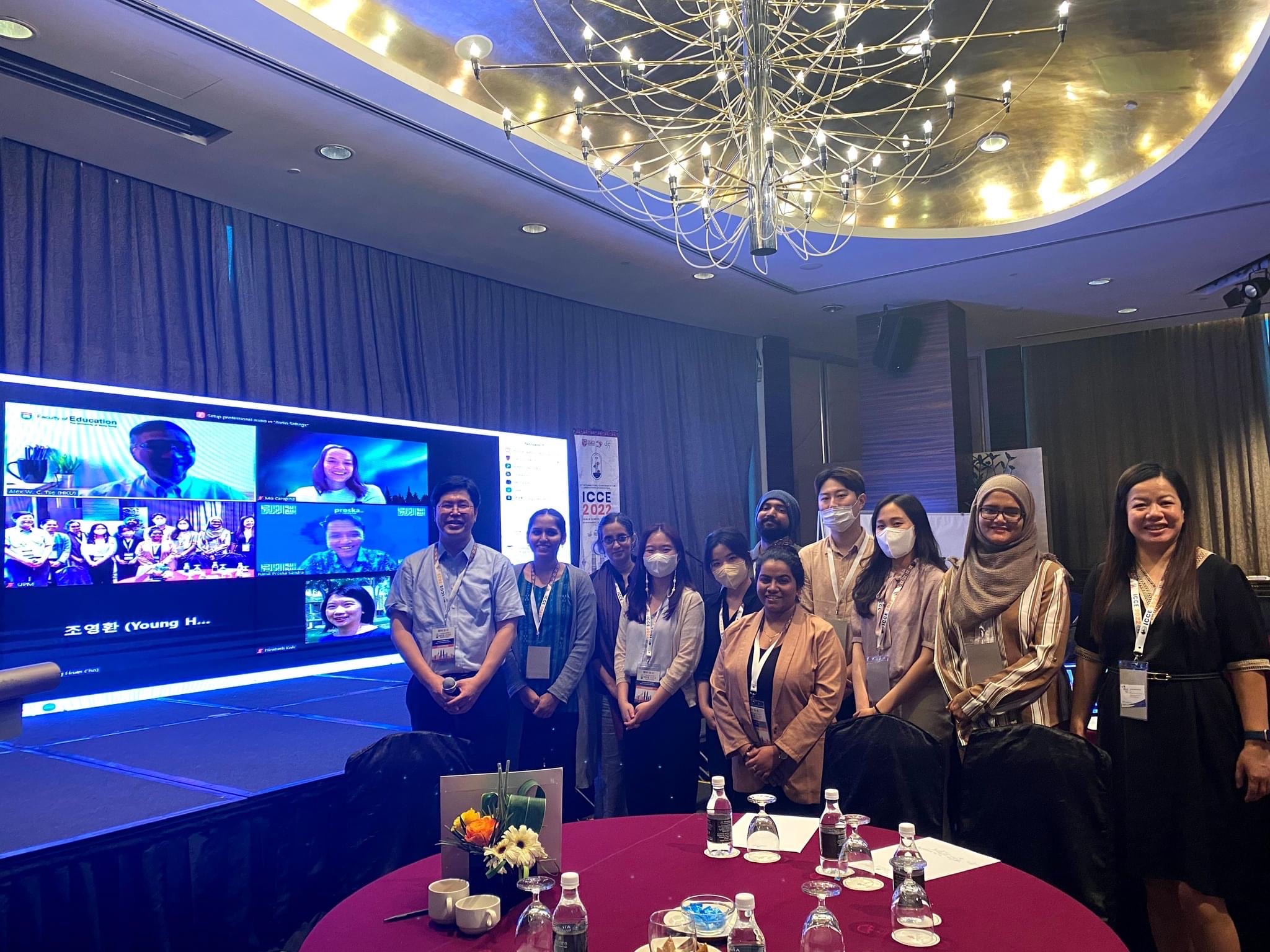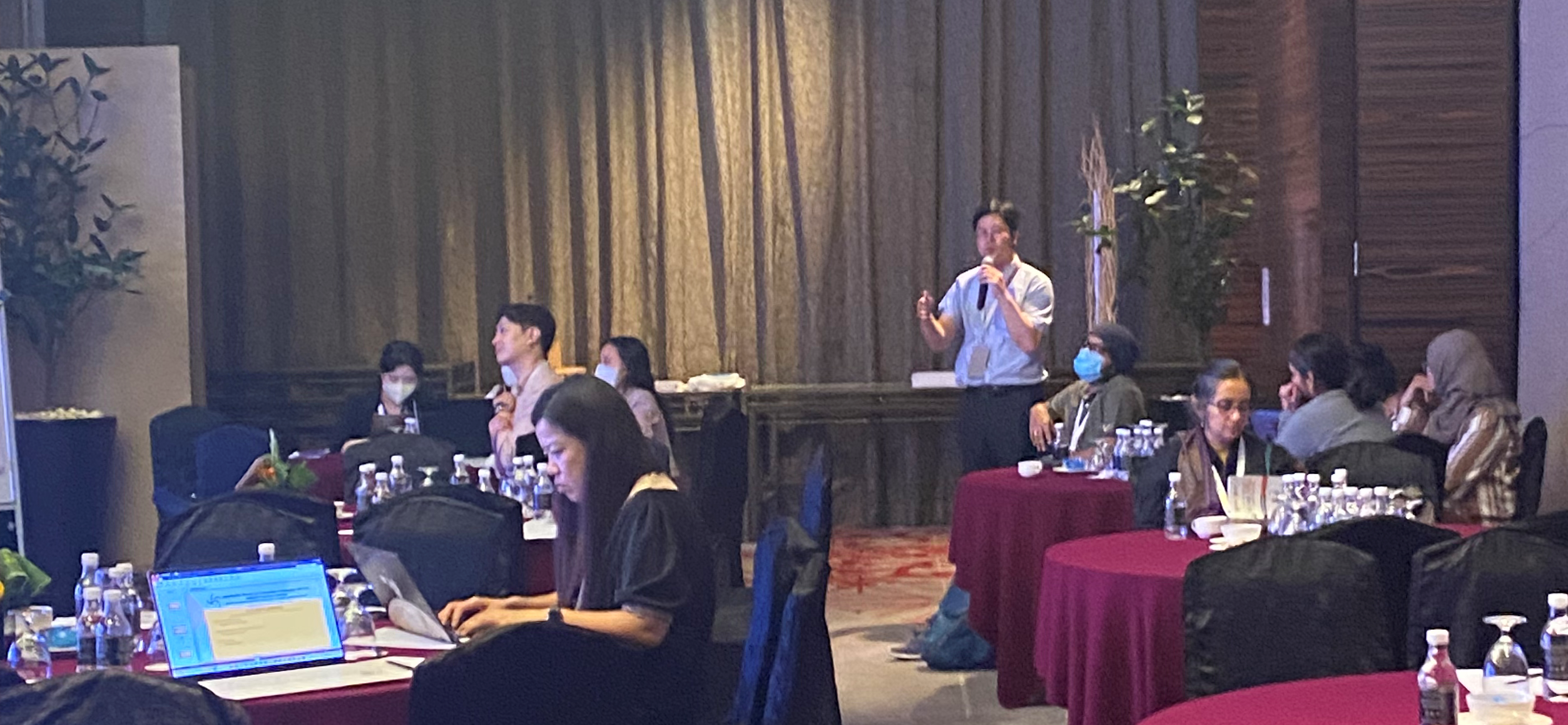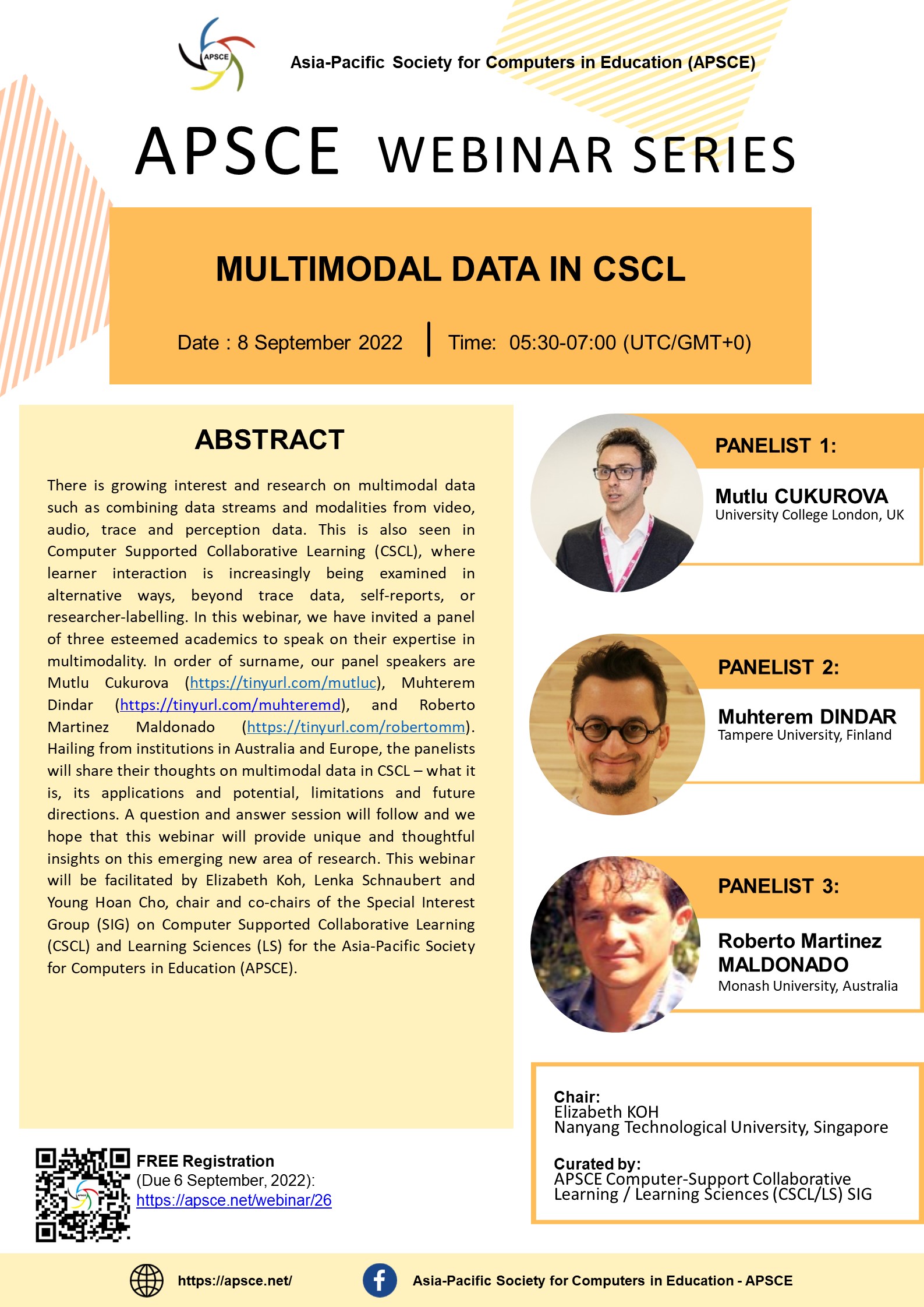You are experiencing our old website. We moved to the new one at https://apsce.net/
You are experiencing our old website. We moved to the new one at https://apsce.net/

______________________________________________________________________________________________________________________________________________________________________________________
Thank You For Those Who Joined Us At ICCE2022 In-Person Or Online For Our Hybrid SIG2 Community-Building Session Which Was 15:10, 30 Nov 2022. It Was A Good Time Of Discussion And Informal Conversation. Here Are Some Photos.



Organizers: Lenka Schnaubert & Chew Lee Teo
Title: Hopes and challenges of social-distance education beyond Covid-19: rethinking social interaction and computer-supported collaborative learning theory in practice
Workshop topic
Research at the intersection of cognitive science, psychology, computer science and education has major benefits for both researchers and educational practitioners. The Learning Sciences emerged in this intersection and it has brought about advancements in both research and practice on deep learning. Much of the research and practice in focus of Learning Science research evolves around aspects of social interaction and collaboration between students and between students and teachers. It is primarily these social interactions that have been severely impacted by various lock-down and social-distancing measures governments imposed in the wake of the Covid-19 pandemic. This has rapidly changed the educational landscape and added additional challenges to education. Beneficial collaborative learning practices in K12 and higher education often depend on students’ direct interaction now impaired by the need to keep physical distance and stay apart. This puts a specific focus on features of social tools or media used for collaboration that may support or constrain interaction practices, affecting how the social situation is experienced by the students. But it is not only peer interaction that is affected: teachers now have to adapt to teaching large courses without getting visual and auditory feedback from their students, often limiting the range and richness of teacher-student interaction. Additionally, they have less student contact limiting the opportunity for personalized guidance they can give individual students struggling with coursework. However, beyond the challenges, we also see a renewed conviction from teachers to adopt technology for interaction with and for orchestrating collaboration among students. We coined the term “social-distance education” to describe this new norm in schools and universities to deliberate the hope and challenges of the current changes in education for social interaction and collaborative learning both in online and face-to-face situations.
In this situation, the Learning Sciences have a pivotal role as they can contribute theoretical and empirical research that may provide practical guidance for education, but in turn, we can also learn from practical implications emerging from the current situation. We are thus in a delicate but also fortunate position to rethink the implication of our work and to seek after new ways to rebuild the bridge between research and practice in collaborative learning and social interaction in this new context of education.
This workshop seeks to initiate a conversation among researchers and practitioners in preparing for a new educational context beyond Covid-19. This workshop invites papers of theoretical, conceptual or empirical nature on the various dimension of cognitive, psychological and educational dimensions of collaborative learning and social interaction that explores groundings for synergizing research and practice for social-distance education. Papers may include, but are not limited to interaction processes during collaborative learning tasks or student-teacher interaction (e.g., during class), understanding emotions and cognitions of others with limited feedback channels, and self-regulated learning processes when learning with minimal teacher contact and guidance.
Rising above the findings in these papers, we would like to initiate three threads of discussion:
a. How do we meet the challenges of social-distance education for teachers and students from a multidisciplinary perspective?
b. What are practical implications of Learning Sciences research for social interaction and collaborative learning in K12 and higher education?
c. What are the implications of social-distance education on the focus of Learning Science research especially regarding collaborative learning and social interaction research?
We acknowledged the bigger ecological consideration in supporting educational practices during and beyond Covid-19, but these administrative issues and organizational challenges, such as accessibility of technology or impact of lock-down on students’ psychological development, will not be the focus of this workshop. Our goal is to generate ideas and conversation on the hopes and challenges of social distance education with a specific focus on collaborative learning and social interaction.
Schedule and submission details
This mini-conference-style 1/2-day workshop will take place online on the 23rd or 24th of November 2020 as a pre-conference event of the 28th International Conference on Computers in Education (ICCE 2020) organized by the Asia-Pacific Society for Computers in Education. Please send in your paper proposals via e-mail to [email protected] using the current ICCE submission template. Short papers (5-6 pages) and full papers (8-10 pages) will be accepted. Accepted papers will be presented online during the workshop and will appear in one volume of the workshop proceedings with ISBN and will be indexed by Elsevier Bibliographic Database. Published workshop papers will be made available on the official ICCE2020 website.
Program Committee
Chew Lee Teo (Organizer), National Institute of Education, Singapore
Lenka Schnaubert (Organizer), University of
Duisburg-Essen, Germany
Freydis Vogel, University of Nottingham, United
Kingdom
Leanne Ma, University of Toronto, Canada
Important Dates
Submission deadline for workshop papers: August 30,
2020 deadline extended until September 7
Acceptance notification of workshop papers: September 18, 2020
Final camera-ready version due for workshop papers: September 27, 2020
Inquiries
Please direct all inquiries regarding the workshop to [email protected]
______________________________________________________________________________________________________________________________________________________________________________________
Title: Questions, Design, Indicators for CSCL
Panelist: ChewLee, Teo. LungHsiang Wong, NIE, Singapore; Bodong Chen, University of Minnesota; Gaowei Chen, HongKong University; Leanne Ma, University of Toronto; Elizabeth Koh, NIE; Seng Chee Tan, NIE.
Abstract
Computer support collaborative learning (CSCL) has been studied in multiple theoretical dimensions which overlapped and merged at different point such as (i) The cognition process and development of students which points towards what we commonly refer to as 21st century competencies; (ii) The interactions between teacher-students-content & environment; (iii) the pedagogical scaffolds for teachers; (iv) seamless virtual and physical, in-and out-of-class environments, and (v) culture and norms of the macro-environment. With such varied lens, there emerged different quantitative and qualitative analysis and interpretation for CSCL, all contributing to the field of CSCL practice and technology. The aim of this panel is to bring together a conversation to consolidate various perspectives and seek a holistic view of “indicators” of CSCL process for practitioner. We hope to focus the outcome specifically on indicators that inform the design and enactment of teachers’ CSCL classroom. The panel will explore connections and impacts of these aspects in the successful CSCL in a teacher-researcher team. We will close the panel by discussion this question-design-indicator framework on our a particular CSCL initiative in Singapore called ‘‘Knowledge Building Community (KBC)’’, which purpose was to promote collaborative learning discussions between teachers and students.